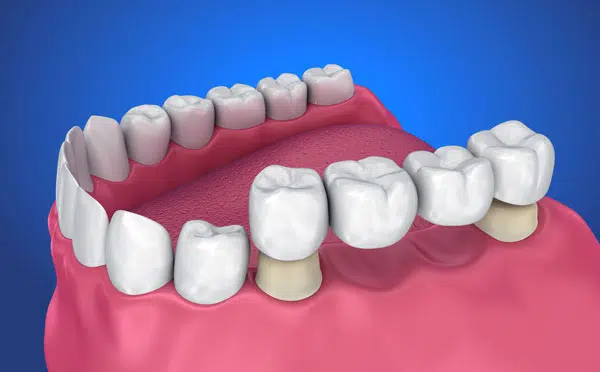
Dental Bridges in Bellevue, WA
Whether you have gaps between your teeth or have lost a tooth due to decay, infection, or injury, you can restore your smile with a natural-looking prosthetic device known as a dental bridge. At Bellevue Azalea Dentistry, we offer expertly crafted dental bridges that not only improve your smile but also support your long-term oral health and dental function.
What Are Dental Bridges?
Dental bridges are artificial replacements used to fill the space created by missing teeth. A typical bridge consists of one or more pontics (false teeth) held in place by abutment teeth—your natural teeth or dental implants on either side of the gap. These prosthetic teeth are commonly made from porcelain, metal, alloys, or a combination of materials to ensure strength and aesthetics.
In most cases, bridges are fused between two porcelain crowns that anchor onto the surrounding teeth, helping restore your ability to chew, speak, and smile with confidence.
How Dental Bridges Help Restore Oral Health
Missing teeth can lead to a variety of dental issues. Over time, the surrounding teeth may shift into the gap, causing misalignment and bite problems. The jawbone beneath the gap may begin to deteriorate, and chewing may become painful or inefficient.
Dental bridges serve both cosmetic and functional purposes by:
- Closing unsightly gaps in your smile
- Preventing remaining teeth from shifting
- Distributing bite forces more evenly
- Restoring your ability to eat and speak comfortably
- Supporting facial structure and reducing the risk of sunken cheeks

Benefits of Dental Bridges
Dental bridges provide a long-lasting solution with numerous benefits:
- Fixed in place – no need to remove for cleaning
- Improved aesthetics – restores natural smile and facial shape
- Enhanced chewing and speech – reduces discomfort while eating
- Supports neighboring teeth – prevents shifting or misalignment
- Boosts confidence – closes visible gaps for a seamless smile
How Many Teeth Can a Dental Bridge Replace?
Dental bridges are highly customizable and can replace one to four teeth in most cases. In rare situations, bridges can be designed to replace five or more teeth, depending on the strength and health of the supporting abutment teeth or implants.
Your dentist will conduct a thorough examination to determine the best approach based on your oral health and treatment goals.
Types of Dental Bridges
There are several types of bridges available, each suited to different clinical scenarios:
Traditional Bridges
The most common type, traditional bridges use crowns on both sides of the gap. They are typically made of porcelain fused to metal or all-ceramic for a natural look and strong durability.
Cantilever Bridges
Used when only one abutment tooth is available. While not suitable for high-stress areas, this option may be effective for front teeth or where support is limited to one side.
Maryland Bonded Bridges
Also known as resin-bonded bridges, these use a porcelain or metal framework with “wings” bonded to the back of the adjacent teeth. They are ideal for front teeth with strong, healthy support structures.
Implant-Supported Bridges
Best suited for replacing several missing teeth in a row, this option uses dental implants as abutments instead of natural teeth. Implant-supported bridges offer the most stability and longevity.
How Dental Bridges Function
Once placed, dental bridges are fixed in the mouth and do not need to be removed like dentures. They are custom-made for each patient, designed to blend seamlessly with your existing teeth. The structure includes crowns on either side of the pontic, which are cemented onto the abutment teeth. The result is a secure, functional replacement that feels and looks natural.
For patients missing multiple teeth, a bridge may be used in conjunction with dental implants to increase stability and preserve bone health.
Dental Bridge Procedure at Bellevue Azalea Dentistry
The bridge placement process typically involves multiple visits:
- Initial Consultation
We assess your dental health and discuss your treatment options, including types of bridges that may be appropriate. - Preparation of Abutment Teeth
The dentist reshapes the abutment teeth by removing a portion of enamel to fit crowns that will support the bridge. - Impressions and Temporary Bridge
Impressions are sent to a dental lab to create your custom bridge. A temporary bridge will be placed to protect your teeth and gums. - Permanent Bridge Placement
Once your permanent bridge is ready (usually within 3–7 days), it is fitted and adjusted. It may be temporarily cemented to ensure fit before final placement.
How Long Do Dental Bridges Last?
With proper care, dental bridges can last anywhere from 5 to 15 years or longer. Their longevity depends on factors such as:
- Daily oral hygiene habits
- Avoiding hard or sticky foods
- Regular dental checkups
- Overall oral health
During your follow-up visits, your dentist will check the bridge’s stability and ensure your gums and surrounding bone remain healthy.
Cost of Dental Bridges With Insurance
The cost of a dental bridge varies based on the type of bridge, materials used, and number of teeth being replaced. On average, bridges range from $500 to $1,200 per tooth unit (including crowns and pontics).
Most dental insurance plans offer partial or full coverage for bridges, especially if the procedure is necessary for function or health. Our team at Bellevue Azalea Dentistry can help you understand your insurance benefits and provide a detailed cost estimate.
Conclusion: Restore Your Smile with a Custom Dental Bridge
Whether you’re missing a single tooth or several, a dental bridge offers a permanent, natural-looking solution that restores your ability to eat, speak, and smile with ease. At Bellevue Azalea Dentistry, we’re committed to delivering high-quality restorative dentistry tailored to your needs.
Book your consultation today and find out if a dental bridge in Bellevue, WA is the right choice for your smile.
Call today to schedule a consultation! (425) 998-8109
Call today to schedule a consultation!
(425) 998-8109
frequenlty asked questions
Who needs a dental bridge?
Most senior patients — or anyone missing one or more teeth — may be good candidates for a dental bridge. To qualify, your surrounding natural teeth need to be strong and healthy enough to support the restoration.
Is a dental bridge safe?
Yes, dental bridges are very safe and have a strong track record in restorative dentistry. However, like any procedure, there are slight risks. Bridges are fixed (non-removable), which can make them a bit harder to keep clean. If the surrounding teeth aren’t strong enough, or if the bridge span is too long, there is a small risk of failure over time.
Are there any side effects of a dental bridge?
Dental bridges are an effective option for replacing missing teeth, but they do come with a few limitations. Patients must have healthy gums and strong natural teeth to support the bridge. Additionally, bridges are typically used to replace only 2–3 teeth in a row. In some cases, dentures or implant-supported restorations may be better suited for extensive tooth loss.
What is the recovery time after getting a dental bridge?
Most patients resume normal functions quickly, though complete healing can take around three months. During the first 2–3 days, it’s best to avoid heavy lifting or strenuous physical activity to allow proper healing and reduce the risk of bleeding or discomfort.
How much does a dental bridge cost?
The cost of a dental bridge varies based on several factors, including the dentist’s experience, the materials used, and the lab that creates the bridge. On average, dental bridges range from $500 to $1,200 per artificial tooth. Be sure to check with your dental insurance provider to see what’s covered before beginning treatment.
Which is better: a dental bridge or a dental implant?
Both are excellent options for replacing missing teeth. A dental bridge may need replacement every 5 to 15 years, depending on care, while implants are considered more long-term or permanent. Dental hygiene, bone health, cost, and insurance coverage can all influence which option is best for you.
How many teeth can a dental bridge replace?
Dental bridges are highly customizable and can typically replace one to four missing teeth in a row. The exact number depends on the patient’s oral health and the strength of the surrounding teeth. In rare cases, a bridge may be used to replace five or more teeth, but this requires a detailed evaluation by your dentist to ensure it can be safely supported. Your dentist will recommend the best option based on your specific needs and oral examination results.
